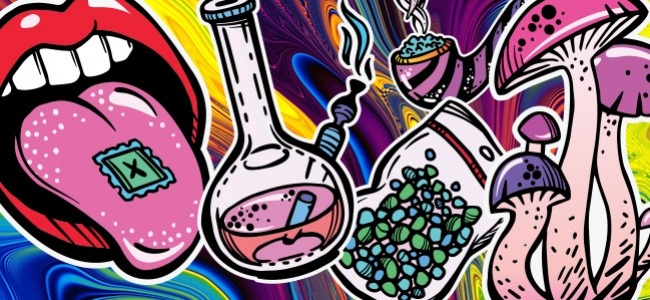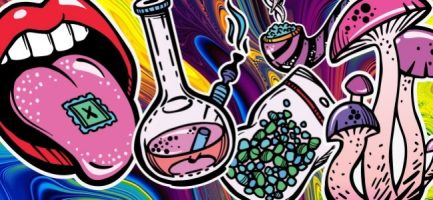Psychedelic substances?
Psychedelics are a classification of plant-based and synthetic substances known for producing an unusual state of consciousness so powerful and unique that they are most often compared to near-death experiences or states of religious ecstasy. When someone hears the term "psychedelic" it is often associated with hippies and the social movements of the 1960s, but beyond the superficial associations and stigmas lies a rich story of ancient human history, scientific discovery and medicinal treatment.
Various psychedelics
The group of substances that fall under the category of “psychedelics” includes both plants and synthetic drugs such as cannabis, MDMA, LSD, psilocybin mushrooms, ayahuasca, DMT and ibogaine. Some of these, such as cannabis, ibogaine and psilocybin mushrooms, occur naturally in the plant world and can be ingested or smoked to produce psychedelic effects. Others like ayahuasca are made by combining two different plants and preparing them in a specific way that produces visionary effects. Outside the plant world are synthetically made compounds such as LSD and MDMA that do not occur in nature.

How do psychedelics work?
What do psychedelics actually do in our brains? With such a diverse range of sources it's difficult to see a connecting factor, but there are many similarities in how these substances interact with our brain chemistry. The active chemical in psychedelics binds to the same receptor in your brain as the neurotransmitter serotonin, which is responsible for relaying information to different parts of the brain and is closely linked to mood, sexual desire, appetite, sleep and memory . While there is still some mystery about how exactly they work in your brain, psychedelics have been shown to both increase and decrease neuronal activity in brain regions such as the prefrontal cortex. The prevailing hypothesis is that the effects of psychedelics are due to increased brain activity, but other research suggests that compounds such as psilocybin may work by regulating and limiting the areas of the brain that act as a filter. This will allow us to temporarily break through the barriers that limit us to a normal state.
Psychedelics and the past
Psychedelics have always played a central role in many cultures around the world thanks to their ability to catalyze transformative experiences and revelations in those who use them. In ancient Zoroastrian and Hindu cultures, the psychedelic substance known as soma played a central role in their religion. In ancient Greece, at the dawn of Western civilization, their sacred annual ritual known as the Eleusinian Mysteries included a brew known as Kykeon, which many scholars believe was a psychedelic drink. Other cultures such as the ancient Egyptians and numerous indigenous tribes also used and greatly valued psychedelics. Many of these indigenous tribes are still around and use psychedelics as a key component in their religion and spirituality.
Why we can use psychedelics now
Today, as the restrictions and stigmas surrounding psychedelics begin to diminish, there is a wide range of exciting new research and applications for these transformative substances. Organizations such as the Multidisciplinary Association for Psychedelic Studies (MAPS), the Heffter Institute, and others have conducted scientific studies on the therapeutic value of psychedelics for treating conditions such as PTSD, substance abuse, end-of-life anxiety, social anxiety, obsessive-compulsive disorder, and depression. Psychedelics are particularly suited to treating these psychological conditions due to their ability to bring a person to an unparalleled state of openness and self-reflection that is beyond their normal everyday ego consciousness. In this revealing state, people can see things about themselves such as chronic behaviors, past traumas, addictions, and judgments that normally operate beneath the radar of the awakening consciousness. After such a revelatory experience, people are often empowered to make fundamental changes in how they live and how they see themselves and the world. Harnessing the power of this 'peak experience' that psychedelics provide is the essence of what makes them so unique and effective. Psychedelic therapy often involves not only taking a psychedelic substance, but doing so with a trained “trip coach” who can help a person open up and experience his/her experience in a supportive environment. This applies not only to clinical psychedelic treatments, but also to the realm of psycho-spiritual therapy that you would find in indigenous psychedelic ceremonies or places such as ayahuasca retreat centers where trained shamans guide people through their experience and keep them grounded and supported. Psychedelics do not provide healing in themselves, but they create a visionary experience that people can use to heal themselves. Because they are so incredibly powerful, both psychotherapists and shamans agree that they should rarely, if ever, be used alone.
The best trip coach
You can count on us for the best trip coach for your situation. Everyone is different and everyone needs a different plan. We can assist you. For example, you can do a free intake by intake form to fill in. Would you like more information first? Please feel free to read or take all the information Contact us.
